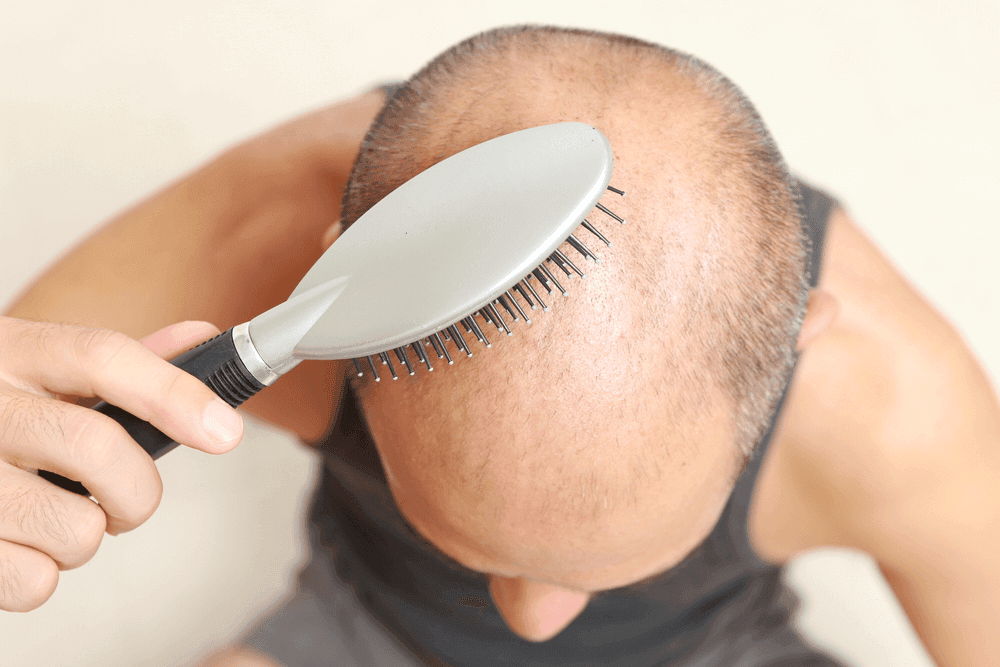Is there a link between hair loss and erectile dysfunction? Clinista experts explain the hormonal, vascular, psychological, and medication-based factors supported by scientific studies.
What Is the Connection Between Hair Loss and Erectile Dysfunction?
Hair loss and erectile dysfunction (ED) are among the most common health concerns in men. At first glance, they may seem unrelated, but scientific evidence shows that these two conditions can share common underlying causes. In this article, we explore the relationship between hair loss and erectile dysfunction through hormonal imbalances, vascular health, medication use, and psychological factors — all supported by academic research.
Shared Hormonal Mechanism: DHT and Testosterone Imbalance
The Role of DHT
The key hormone responsible for male pattern baldness (androgenetic alopecia) is dihydrotestosterone (DHT).
DHT is the active form of testosterone, converted by the enzyme 5-alpha reductase. In some men, hair follicles are overly sensitive to DHT, leading to progressive hair thinning and loss.
At the same time, imbalances in testosterone and DHT metabolism can also increase the risk of erectile dysfunction. Low testosterone levels or disruptions in DHT conversion may negatively impact sexual performance and libido.
Vascular Health: Hair Loss as a Marker of Cardiovascular and Sexual Function
Scientific research indicates that men experiencing vertex (crown) baldness are more likely to have cardiovascular disease.
This connection often stems from endothelial dysfunction — damage to the inner lining of blood vessels. The same vascular impairment that affects heart and brain circulation can also reduce penile blood flow, leading to erectile dysfunction.
In short, hair loss may act as an early warning sign of broader vascular issues affecting both heart and sexual health. For this reason, men with noticeable hair thinning should also be screened for cardiovascular risk factors.
Finasteride and Dutasteride: Hair Loss Treatment and Sexual Side Effects
Finasteride and dutasteride are among the most common medications prescribed for male hair loss.
They work by reducing DHT levels to slow or prevent further hair thinning.
However, studies show that these drugs may cause potential sexual side effects, including:
-
Decreased libido
-
Erectile dysfunction
-
Ejaculatory problems
Although these effects are often temporary, some men report persistent symptoms after stopping the medication — a condition known as post-finasteride syndrome.
That’s why it’s essential to consult with a urologist or endocrinologist before beginning treatment, and to discuss non-hormonal or procedural alternatives such as PRP, mesotherapy, or hair transplantation with a qualified hair restoration specialist.
Psychological Effects: Confidence, Self-Image, and Sexual Well-being
Hair loss is not just a physical change — it also has profound emotional and psychological consequences.
Men who experience hair loss at an early age often face:
-
Reduced self-confidence
-
Social anxiety
-
Stress and depressive symptoms
These psychological factors can contribute to psychogenic erectile dysfunction, a form of ED driven by emotional rather than physical causes.
That’s why Clinista provides not only medical treatments but also comprehensive support to help patients manage both the physical and psychological aspects of hair loss.
Social Perception and Attractiveness
Research shows that male pattern baldness can negatively influence perceived attractiveness, confidence, and even cognitive impression among peers and potential partners.
This can lead to emotional stress and social withdrawal.
However, hair loss is not irreversible.
At Clinista, we design personalized hair loss treatment plans tailored to each individual’s hair type and health condition.
Our Istanbul-based clinic offers advanced medical therapy, PRP, mesotherapy, and natural hair transplantation techniques to help men restore their hair — and their confidence.
What Should You Do If You Experience Both Hair Loss and Erectile Dysfunction?
If hair loss and erectile dysfunction occur together, it should not be ignored.
Here are key steps for early detection and prevention:
-
Check cardiovascular risk factors (blood pressure, cholesterol, blood sugar).
-
Get hormone level tests and a urological evaluation.
-
If using finasteride or dutasteride, discuss potential sexual side effects with your doctor.
-
Seek psychological or sex therapy support when necessary.
Conclusion
Hair loss and erectile dysfunction are significant indicators of overall male health.
They are not merely aesthetic or temporary concerns — they often signal deeper issues involving hormone balance, vascular health, and mental well-being.
When identified and managed early, both conditions can be effectively treated, helping men maintain long-term vitality, confidence, and sexual health.
If you are experiencing hair loss or related symptoms, contact Clinista’s medical team for a free consultation and learn more about personalized hair restoration and treatment options.
References
- Yamada, T., et al. (2013). Male pattern baldness and its association with coronary heart disease: A meta-analysis. BMJ Open, 3(4), e002537.
- Alwani, M., et al. (2021). Cardiovascular Disease, Hypogonadism and Erectile Dysfunction. Journal of Clinical Medicine, 10(12), 2589.
- Lee, S., et al. (2019). Adverse sexual effects of treatment with finasteride or dutasteride: A systematic review and meta-analysis. Clinical Drug Investigation, 39(6), 495–505
- Pereira, A. F. J. R., et al. (2020). Post-finasteride syndrome: Real or myth? American Journal of Men’s Health, 14(6), 1557988320970194.
- Krajewski, P. K., et al. (2025). Sexual Dysfunction in Alopecia Areata: A Systematic Review. International Journal of Environmental Research and Public Health, 22(3), 1229.





